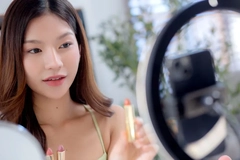Natrue and ENBA fight greenwashing in cosmetics industry and highlight verified natural brands

12 Mar 2024 --- The International Natural and Organic Cosmetics Association (Natrue) and the European Natural Beauty Awards (ENBA) collaborate to combat greenwashing within the cosmetics industry and amplify the visibility of verifiable and high-quality natural cosmetics across Europe.
This partnership combines Natrue’s experience in certification and regulatory affairs with ENBA’s platform dedicated to recognizing and promoting the achievements of “exceptional” natural beauty brands.
Mark Smith, director general at Natrue, tells Personal Care Insights: “Unchecked business malpractices, like greenwashing, run the risk of sowing consumer mistrust, misrepresenting products on the market as ‘greener’ than they actually are (with possible negative impacts for the environment), and leading to unfair competition by destabilizing the level playing field for businesses.”

A recent study from the European Commission exposed consumers’ confusion and mistrust of environmental claims. Consumers are aware of greenwashing, but it remains challenging to make informed decisions about their purchases without risking being exposed to it.
- The organizations assert that they are committed to:
Advocating for natural cosmetics: Promote cosmetics brands that rigorously adhere to stringent natural cosmetics standards. - Support innovation and sustainability: Recognize brands that demonstrate innovation in their formulation and production processes and a steadfast commitment to sustainability and efficacy.
- Increase consumer awareness: Empower consumers through education about the value of certified natural and organic cosmetics, thus enabling them to make well-informed choices.
Emphasizing ethical brands
Smith will join the ENBA’s jury, providing his expertise in the natural and organic cosmetics sector to “ensure rigorous and fair evaluation” of the participating products in the Innovation Categories Awards.
 The EU does not currently define what a natural cosmetic is. Smith says members of the cosmetics industry can fight greenwashing through a combination of bottom-up and top-down approaches, such as:
The EU does not currently define what a natural cosmetic is. Smith says members of the cosmetics industry can fight greenwashing through a combination of bottom-up and top-down approaches, such as:
- Brand pressure through raised consumer awareness and demand for “green” products.
- Industry competition driving best practices.
- Increased investment in green, sustainable innovation as part of the company’s policy, R&D and NPD strategies.
- Better regulation of “green” products assisted by harmonized tools, guidance or criteria (methodologies) for benchmarking and claim support.
- Improved control mechanisms either before or after products hit the market.
The association will also leverage its network and communication channels, promoting awarded brands and their products to a broader audience.
Adjusting legislation to combat greenwashing
According to Smith, the EU does not currently have any harmonized criteria or guidance within the EU Cosmetics Regulation to determine what a natural (or organic) cosmetic should be. Although there are legal provisions for cosmetic product claims to comply with, there is no precision to describe when a product claim such as natural would be considered misleading or not.
“In this context, a natural cosmetic is separate from a conventional product by the fact it should contain natural ingredients, but there is no precision when it comes to how many natural ingredients must go into a natural product to support that claim,” he continues.
“In terms of what makes a cosmetic natural — since there is no official definition and multiple standards on the market — there is some degree of subjectivity. [We should] consider an approach that reflects consumer expectations and supports verifiable criteria through independent third-party certification. The Natrue label criteria reflect consumers’ perceptions and expectations since it covers requirements from sourcing to packaging and what a natural or organic cosmetic must and must not be to be certified and carry the claim ‘natural’ (or organic).”
Future of cosmetics
Natrue’s director general predicts that in the future, with emerging and evolving EU legislation to combat greenwashing, it is likely to see the removal of unsubstantiated sustainability (social and environmental) claims from the market.
“Over the past five years, in particular, the cosmetics industry has made improvements when it comes to environmental claims. This results from increased consumer interest in natural products, changes at a political-regulatory level, growing competition and increased investor interest in sustainable business practices,” Smith concludes.
By Sabine Waldeck













